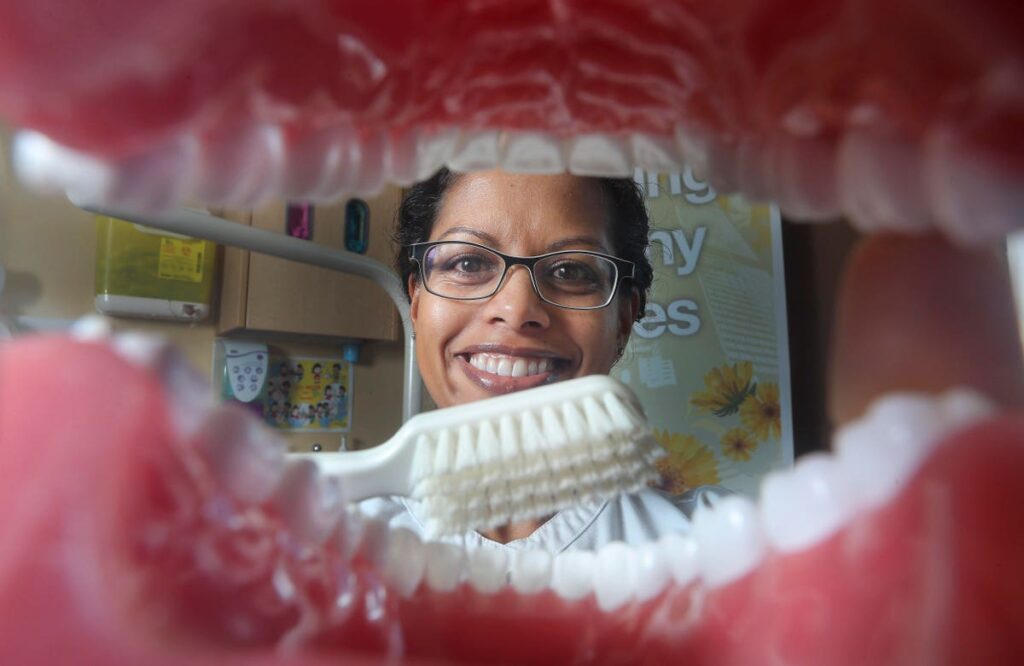It is important to brush and floss your teeth twice a day. (Richard Lautens/Toronto Star via Getty … [+]
Periodontal disease, dental caries and a high number of missing teeth were associated with an increased risk of dementia, according to researchers. As the average life expectancy of Americans increases, more people are being diagnosed with dementia. To prevent dementia, it’s important to eat a healthy diet, exercise, quit smoking and control chronic diseases like high blood pressure and diabetes. Here’s why you should also take good care of your teeth and regularly follow up with your dentist.
What Studies Have Shown
In this study, information on oral hygiene including professional dental cleaning and the frequency of tooth brushing, was collected using a self-administered questionnaire. The researchers found that professional dental cleaning and frequent tooth brushing were associated with a decreased risk of dementia. Additionally, dentists evaluated the patients’ teeth and found that periodontal diseases, dental caries and 8-14 missing teeth were associated with an increased risk of dementia.
This study adds to the growing body of evidence that links oral health to dementia. I first became aware of the association when a colleague and friend researched the association between periodontitis and cognitive impairment in older adults, a study that he later published. Because of this study, and others like it, some researchers have said that improvement of oral health could be beneficial for the prevention of dementia. It is important to note that these studies have found an association and have not demonstrated causality.
Oral health has been linked to diseases beyond dementia, including cardiovascular disease, respiratory disease, rheumatoid arthritis, gastrointestinal diseases, preterm birth and low birth weight. Physicians get minimal education on oral health during medical school and typically get even less during their residency training so your doctor may not feel comfortable giving you guidance on the role oral hygiene plays in your overall health.
Dentist Recommendations
“The importance of interprofessional education between medicine and dentistry is becoming apparent. More recently medical students have shown an increased interest in oral health. New York Medical College offers an Oral Health elective in which medical students spend up to a month rotating alongside the dental students at Touro Dental Health,” says Dr. Aaron Yancoskie, Board Certified Oral and Maxillofacial Pathologist and Assistant Dean for Academic Affairs at Touro College of Dental Medicine. “There are still many more avenues to bring oral health into the medical curriculum.”
To improve your oral health, you should brush your teeth for at least two minutes at least twice a day—in the morning and before going to bed. You should also use floss at least twice a day and rinse with mouthwash. Flossing before you brush allows you to clean away the loosened food bits and bacteria. Dr. Yancoskie points out that “Flossing well requires patience and practice yet the benefits are well worth the effort. Using floss correctly helps to remove the pathogenic bacteria associated with periodontitis from beneath the gumline. Brushing alone is unable to do this.” If you are using a manual toothbrush, it is important to change your toothbrush every 3-4 months to make sure the bristles are still working to keep your teeth clean. By following these tips, you will contribute to keeping your teeth clean, nice smile, healthy gums and fresh breath.
Additionally, you should see a dentist regularly for teeth cleanings. This should occur every six to 12 months, but at least every three months if you have a diagnosis of periodontitis. Sadly most Americans have not seen the dentist in the past year. The leading reason for why they did not visit the dentist is cost. Other reasons include fear of the dentist, inconvenient location or time, trouble finding a dentist and not thinking it is necessary.
Oral Health In America
Despite best intentions, many people will face challenges following these recommendations due to disparities in access to care. Oral healthcare in America is lagging behind general healthcare, partly due to oral care not being covered under many health insurance plans. According to the American Dental Association, for adult ages 19-64, 59% have private dental benefits, 7.4% have medicaid dental benefits and 33.6% do not have dental benefits. There also has not been as much focus on preventive oral care. Many people only go to the dentist when they have mouth pain, which is typically late in the course of dental illness.
For example, Marry Otto, broke the story of Deamonte Driver who died in 2007 partly because he did not have timely access to a dentist to do a simple tooth extraction. Before he could access care, he had an abscess in his mouth that spread to his brain. Despite going through multiple surgeries and a prolonged stay in the intensive care unit, he passed away. This sad story speaks to the disparities in access to oral care that is prevalent in the U.S.
The Deamonte Driver Dental Project is a van that goes to schools and other places in the community … [+]
Maintaining good oral hygiene is just one example of a lifestyle change that may decrease your chances of getting dementia later in life. October is oral hygiene awareness month, so this is a great time to improve your oral hygiene. Be sure to visit your dentist and thank your dental hygienist for helping to keep you healthy.


